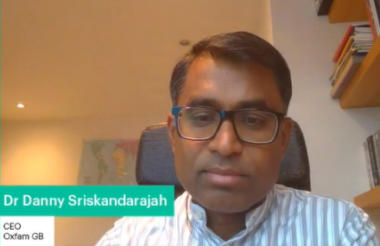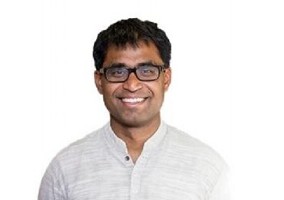Big charities have become too similar to corporates in the way they operate, Oxfam GB's chief executive said yesterday.
Danny Sriskandarajah, CEO of Oxfam GB, was speaking during a panel session at The Resource Alliance’s International Fundraising Conference (IFC Online 2020), which discussed whether the charity sector has become too self-centred.
He said that some charities have been “mimicking some of the worst practices of the corporate world” as he set out his vision for Oxfam's own future role.
Competition and growth at all costs
Moderator Marcus Missen, director of communications and fundraising at WaterAid, asked whether the sector has been focusing too much on organisations and too little on impact, and whether the shift from big organisations to civic movements such as Extinction Rebellion could mean the end of charity as we know it.
Sriskandarajah agreed that we are at “an inflection point” and that we “shouldn’t privilege” the institutional parts of civil society “at the cost of resourcing and supporting other bits of civic life”.
He said: “We are paying the price of institutions in civil society in some ways mimicking some of the worst practices of the corporate world.
“We built these big brands that have felt like they're only interested in self-preservation or growth at all costs, that compete with each other, that have replicated the internal bureaucracies and hierarchies of other corporate formations.”
Big charities shouldn’t ‘hog space’
Sriskandarajah added that this does not mean that big charities should be dismantled, only that they need to rethink their role.
“I think it does help to have institutions that have collective memory, that have organisational power, that can be in other corporate spaces, for example negotiating with businesses or the state.”
But he said the problem is when institutions “start to hog space, hog profile, hog resources, at the cost of wider civic action”.
“I do think this is the beginning of the end of dominant NGOs as the primary organising model for civic life.”
Passing the mike
Kumi Naidoo, the former director of Greenpeace International and secretary general of Amnesty International who is now global ambassador for Africans Rising, added that big NGOs also shouldn’t “hog access”.
He said: “For UN agencies, national governments and so on, it's easier to go to a brand name NGO and treat it as a one-stop shop.
“One of the things that needs to change moving forward is that the big branded organisations must say: ‘Hang on. There are more legitimate grassroots formations, people dying in the Amazon, people dying in the frontlines in Syria and so on’.
“We need to find ways to get them to have voice, and we need to step back.”
Sriskandarajah agreed that “we should be passing the mic more readily”.
Oxfam to launch new strategy focusing on anti-racism
Sriskandarajah also said that Oxfam will launch a new strategy later this year, with a focus on anti-racism and climate change.
He said: “We've put our commitment to becoming an anti-racist organisation at the heart of Oxfam Great Britain's future, partly because I think, especially in the development sector, which grew out of the colonial project, we have to recognise our complicity in that project.”
He also said climate justice will be “one of the three thematic areas that we will focus on”.
He said that in his 18 months at the charity, his team have been “on a journey” to “reimagine our institution for the next few years”.
This includes creating a more participatory institution that goes back to Oxfam’s founding principles.
He said: “Oxfam was founded in 1942 by a bunch of volunteers. We didn't have a first paid staff member for years.
“And yet, we're now associated with this idea of a big bureaucratised, corporatised NGO. Maybe the future is a bit of ‘back to the future’ for us, or for the likes of us – to go back and reclaim that heart of voluntary action.”
A global network for social justice
Sriskandarajah said the vision for Oxfam is to move away from the model of a traditional NGO where “we collect money from rich people in the north and give it to poor people, beneficiaries in the south”.
He said: “It was probably never an effective model and it certainly doesn't feel like the cutting edge of where we want to be.
“We're trying to reimagine a global network for social justice, where we'll build on the heritage and the power of bits of Oxfam like ours here in the UK, but we're also strengthening other bits of the Oxfam network elsewhere.
“We've already got new Oxfams in Brazil, in South Africa and Mexico; in Turkey, a 30-year-old women's rights organisation has just become Oxfam Turkey.
“Our vision over the next five to 10 years is to create a globally balanced network that can build from below, but also beyond borders, because I think there is value in that.
“Many of the biggest challenges facing our world have to have some element of global response to them. But they also need to be grounded in local civic action, in the lives and livelihoods of real people. And that’s where I think we see our future.”
Related articles












